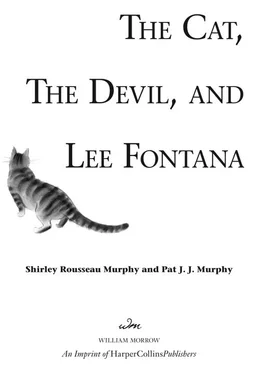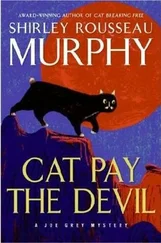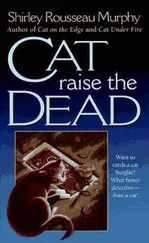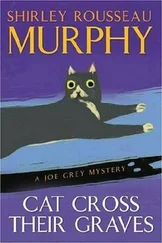Shirley Murphy - The Cat, the Devil, and Lee Fontana
Здесь есть возможность читать онлайн «Shirley Murphy - The Cat, the Devil, and Lee Fontana» весь текст электронной книги совершенно бесплатно (целиком полную версию без сокращений). В некоторых случаях можно слушать аудио, скачать через торрент в формате fb2 и присутствует краткое содержание. Год выпуска: 2014, Издательство: HarperCollins, Жанр: Старинная литература, на английском языке. Описание произведения, (предисловие) а так же отзывы посетителей доступны на портале библиотеки ЛибКат.
- Название:The Cat, the Devil, and Lee Fontana
- Автор:
- Издательство:HarperCollins
- Жанр:
- Год:2014
- ISBN:нет данных
- Рейтинг книги:5 / 5. Голосов: 1
-
Избранное:Добавить в избранное
- Отзывы:
-
Ваша оценка:
- 100
- 1
- 2
- 3
- 4
- 5
The Cat, the Devil, and Lee Fontana: краткое содержание, описание и аннотация
Предлагаем к чтению аннотацию, описание, краткое содержание или предисловие (зависит от того, что написал сам автор книги «The Cat, the Devil, and Lee Fontana»). Если вы не нашли необходимую информацию о книге — напишите в комментариях, мы постараемся отыскать её.
The Cat, the Devil, and Lee Fontana — читать онлайн бесплатно полную книгу (весь текст) целиком
Ниже представлен текст книги, разбитый по страницам. Система сохранения места последней прочитанной страницы, позволяет с удобством читать онлайн бесплатно книгу «The Cat, the Devil, and Lee Fontana», без необходимости каждый раз заново искать на чём Вы остановились. Поставьте закладку, и сможете в любой момент перейти на страницу, на которой закончили чтение.
Интервал:
Закладка:
He stood at the rail as the tall, lean guard cast off and began to coil line. One of the guards would have a shopping list in his pocket, they’d pick up needed supplies in Steilacoom before they headed back to the island, maybe food stores that had been trucked down from Tacoma, though most of their staples came by boat from there or from Seattle. Easing free of the dock, they were under way, the twin diesels churning the water in a long white tail boiling out behind them. Moving up to the bow, Lee stood chilled by the heavy mist and salt spray, riding the choppy waves liking the speed, and soon he began to feel easier.
Off to his left the overcast had lifted a little above the hills of Tacoma, the sun trying to burn through the murky cover. But it wouldn’t burn away much, sun wouldn’t blaze down on the land like the pure, hot desert where he was headed. As they approached land, the smokestacks from the iron smelters rose black and ugly, smelters that dumped their hot slag into the sound, souring the waters so nothing would grow along that shore. He could picture the streets and sidewalks of the city slick and wet from the mist and busier than he’d known: too many people, too many cars, not the quiet he’d grown used to on the island—the prison had been quiet most of the time, until a rumble erupted to stir things up, a dose of trouble breaking the monotony until armed guards stepped in and broke up the fight. Looking away toward the vast horizon of the mainland, he felt uneasy at so much freedom ahead, so much emptiness, so many choices, no one telling him what to do, no direction to his life except that he made for himself.
The prison counselor said that was what a parole officer was for, to guide him, help him over the rough spots until he’d settled in again. Well, to hell with that. He didn’t need some wet-behind-the-ears social worker hardly out of diapers telling him how to live his life.
What the hell, the whole world lay open to him. What was he afraid of? He’d have free run at whatever he wanted. All kinds of robberies and scams were open to him, a chance at whatever he chose to take down, so what was he bellyaching about? Hell, yes, he’d get used to freedom again and to the new ways, even if life was more sophisticated, and people maybe harder to manipulate. The old habits hadn’t all died. The old-fashioned, trusting ways would still prevail among the smaller towns and farms, among the honest people with their straightforward talk, their unlocked doors and innocent views, so many folks just waiting and ripe for the taking.
He tolerated the loud suit and noisy shoes for the half-hour boat ride to Steilacoom, was eager to get rid of them as they pulled up to the scrappy little community, coming in close to the tall pier that jutted high above them, the small prison boat rocking against the tall pilings. Couple of buildings up there along the pier, and he could smell coffee over the smell of dead fish. The boat nosed into the short catwalk that led to the shore. The train station was just on the other side of the tracks, dumpy wooden building, the town rising up the hill behind it, shabby little houses half hidden by the Douglas fir trees, the homes of lumber workers and maybe smelter workers from up around Tacoma. Ten years back, he hadn’t seen much of Steilacoom, he’d been dumped off here from a marshal’s car, handcuffed and in leg chains, after a silent ride down from the Tacoma jail through dense fir forests and past a couple of lakes. The marshal had handed him over to a McNeil guard. The guard had hustled him across the tracks, out along this same ramp he was descending now, and into the prison boat, had locked his leg chain to a wooden bench, and they’d been on their way over the rough, choppy water, McNeil Island looming ahead, dark green forests, pale green clearings, hard-faced concrete buildings—heading for his new and extended island vacation, courtesy of the U.S. Bureau of Prisons.
Now, stepping down off the ramp clutching his paper bag, he stood a moment watching the guards unload their prisoner—chained like a walking ghost of himself from ten years back. As they moved away into the train station he double-timed up a set of wooden steps and onto the wooden pier, separating himself as far as he could from the group. Heading out along the pier past a storage shed, he followed the smell of fresh coffee toward the lighted windows of a little café.
The room was dim inside, the shellacked walls made of beveled pine boards. Four wooden booths, two tables with Formica tops and stainless steel chairs, and a wooden bar. The woman behind it nodded to him, trying not to smile as she took in his pinstripe, pimp getup. Two men at the bar, plaid flannel shirts, heavy pants and boots, maybe lumberjacks. They turned to look and nodded briefly. Lee took a stool halfway down the bar, between the men and an old woman. He watched one of the men pour half his freshly opened beer into a frosted mug, and then tip in a glass of tomato juice and a big squirt of Tabasco; red beer was popular in this area. Lee didn’t want to think how it would taste. The pudgy old woman down at the end, on the last bar stool, leaning against the wall, was dressed in several layers of clothes, none of them too clean. In his day you hadn’t seen many woman hobos, but that was what she had to be. She smelled of sour urine, sour clothes, and a body that hadn’t seen soap for a while. He ordered coffee and a slice of lemon pie from the glass case, then, hauling his paper bag, he headed for the men’s room, holding his breath as he passed her.
Beside the door to the bathroom hung four wanted posters. Lee knew two of the men, they had left McNeil in the dark of night in one of the local residents’ small boats. The boat had later been found adrift against the shore; the escapees were still at large. Lee took a good look at the other two pictures, at the men he didn’t know. He was always interested in who was on the outside, maybe desperate and volatile, that might pose a threat if he ran up against them. And maybe part of his interest in the posters stemmed from when he was a boy, on those rare trips to town when he could enjoy the handsome photograph of his famous grandpappy.
Stepping on inside the little cubicle, he changed into his soft old Levi’s and one of three shirts from the paper bag, removed Mae’s picture and put it safely in his Levi’s pocket. Feeling down into his right boot, he found the bit of paper with the folded bills inside, just as he’d left them. Seven hundred dollars, and he was mighty glad to find it all there. He left it taped in his boot, didn’t shove it in his pocket along with the train ticket, his seventy-five dollars of prison earnings, and the prison-made knife. A bit of dried manure still clung to the sole of the run-over boot. He removed his rolled-up old jacket, shook the wrinkles out as best he could, then stuffed the prison clothes down in the paper bag. When he left, he’d drop them in the refuse bin out near the door of the train station—they wouldn’t be there long, that old woman would fish them out again, sell the clothes for food or wine.
Coming out, he drew amused looks from the barkeep and the three customers, all of whom had likely seen, over the years, dozens of prisoners shed their cheap prison garb in just the same way. The barkeep set his pie and coffee before him and gave him a friendly smile, as if she knew exactly how good it felt to be back in the comfort of his own clothes. She was nearly his age, white hair smoothed back showing glimpses of pink scalp, lively brown eyes. How many departing inmates before him had she served, along with the locals, with the lumber and smelter men, and with the civilian residents of McNeil come ashore on one errand or another. He watched the lumberjacks down their red beer, still fascinated with how that would taste. He was just finishing his pie and coffee when he heard the train whistle.
Читать дальшеИнтервал:
Закладка:
Похожие книги на «The Cat, the Devil, and Lee Fontana»
Представляем Вашему вниманию похожие книги на «The Cat, the Devil, and Lee Fontana» списком для выбора. Мы отобрали схожую по названию и смыслу литературу в надежде предоставить читателям больше вариантов отыскать новые, интересные, ещё непрочитанные произведения.
Обсуждение, отзывы о книге «The Cat, the Devil, and Lee Fontana» и просто собственные мнения читателей. Оставьте ваши комментарии, напишите, что Вы думаете о произведении, его смысле или главных героях. Укажите что конкретно понравилось, а что нет, и почему Вы так считаете.












